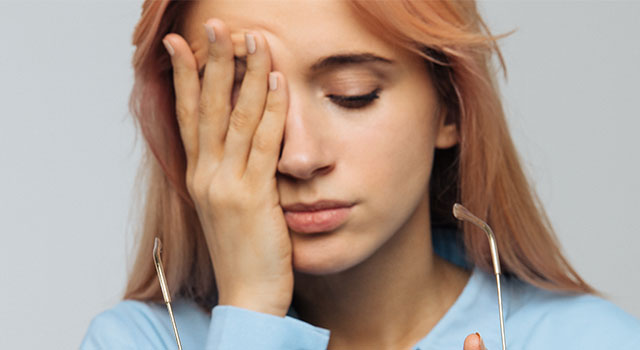
Though it may seem harmless, rubbing your eyes is something many of us do from time to time. Doing so feels good because it stimulates tear flow and eye lubrication, which offers relief for dry eyes and helps remove dust and other irritants. Furthermore, rubbing your eyes can be therapeutic, as pressing down on your eyeball stimulates the vagus nerve, which decreases your heart rate, thus relieving stress.
So why do eye doctors advise against rubbing your eyes? That’s because rubbing your eyes poses a threat, especially now, as COVID-19 can be spread through the eyes’ mucous membranes. Moreover, rubbing can potentially damage your eyes’ structure and vision.
Why is Rubbing Your Eyes Harmful?
- Continuous eye rubbing in susceptible individuals can cause the cornea to thin and weaken, leading it to bulge forward and become more cone-like. This is known as keratoconus — a serious condition that can lead to distorted vision and ultimately the need for a corneal transplant or specialized contact lenses, such as scleral lenses.
- If you have a foreign object in your eye, your natural instinct is likely to rub it in an attempt to remove the object. However, this can potentially cause more damage as the object can scratch the cornea. Instead, try flushing it out with saline solution or artificial tears.
- From a hygienic perspective, it’s important to remember that your hands are covered in germs and bacteria. Therefore, sticking a finger that hasn’t been thoroughly washed with soap and water into your eyes can cause an infection, such as conjunctivitis, to flare up. Recent evidence shows that the coronavirus can also be transferred from the hands to the eyes.
- Rubbing is harmful to people with certain pre-existing eye conditions. If you have progressive myopia (short-sightedness caused by a lengthened eyeball) or glaucoma (a condition that damages the optic nerve), rubbing your eyes can exacerbate the condition and worsen eyesight. Eye rubbing is particularly bad for a glaucoma patient with already heightened eye pressure. It can engender nerve damage and permanent vision loss.
- Retinal tear or detachment can occur due to the heightened eye pressure caused by the rubbing.
- Excessive eye rubbing can negatively affect your appearance. It can cause tiny blood vessels to break, resulting in bloodshot eyes, dark circles and wrinkles around the eyes.
Why Do We Rub Our Eyes?
When your eyes are itchy, it is tempting to rub them. But rubbing releases histamines, which make the itching worse, which in turn leads to more aggressive eye rubbing.
Rubbing your eyes isn’t all bad. It releases more tears, which in turn causes the meibomian glands, situated within your eyelids, to secrete much-needed oil into our eyes. That adds moisture and protects our tears from evaporating.
However, if you frequently rub your eyes because they are dry or irritated, contact Dr. Carole Burns immediately.
How to Stop Rubbing Your Eyes
Keep your eyes hydrated by using artificial tears or eye drops. They can be found over the counter at the pharmacy, and are especially effective against dry eyes. Certain eye drops, such as antihistamines and mast cell stabilizers, can be prescribed by Dr. Carole Burns to help prevent the itchy feeling that leads you to instinctually rub your eyes. In more severe cases, such as in allergy sufferers, steroid eye drops can be used to avoid chronic eye rubbing.
Excessive eye rubbing, whether due to chronic dry eye, itchy eyes, or habit, should be addressed to prevent any ocular and vision damage. Contact Professional VisionCare at Lewis Center to schedule a visit, determine the cause of your itchiness, and find out which drops to use in your specific case.































